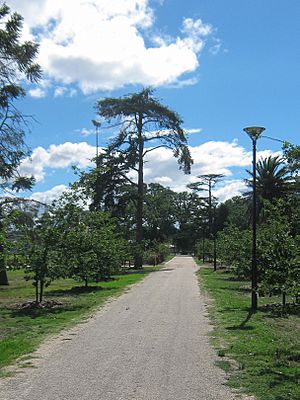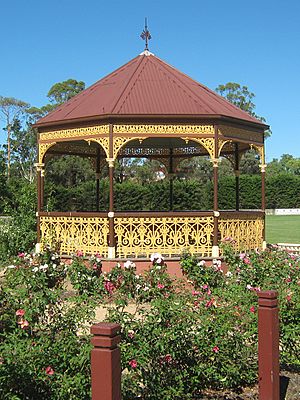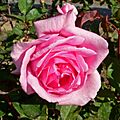
Maddingley Park path running north-west from the south gate. The Nieuwesteeg Heritage Rose Garden is behind the central cedar.

North view of the 1905 Dickie bandstand surrounded by the heritage rose collection. The six beds are numbered from the right.
The Nieuwesteeg Heritage Rose Garden is a special collection of rare and unusual roses. Most of these roses are a type called hybrid teas, which were bred in the early 1900s. You can find this garden in Maddingley Park, located in Bacchus Marsh. This town is about 50 km (31 mi) west of Melbourne and 14 km (9 mi) west of Melton. The rose garden started in 2009. Many of its roses were given by a rose expert named John Nieuwesteeg.
History of Maddingley Park
Maddingley Park was once a police paddock. It was set up for picnickers and visitors from Melbourne when the railway station in Bacchus Marsh opened in 1887. The Dickie bandstand, a special stage for music, was built in 1905. By the time of the Second World War, the park had beautiful gardens and other features. Many of these have since changed or disappeared.
Today, Maddingley Park has a football and cricket oval. It also has grass tennis courts and a netball court. You can see many large trees from the 1800s. There is also another Memorial Rose Garden on the north side of the park. This garden is near the park's north-west entrance on Bacchus Marsh–Geelong road.
Exploring the Nieuwesteeg Heritage Rose Garden
This special rose garden is on the south side of Maddingley Park. It is close to the entrance from Bacchus Marsh railway station. The garden has 40 different heritage roses. Many of these roses were bred or found in Australia. Some are very rare, created by famous Australian rose breeders like Alister Clark, Olive Fitzhardinge, Frank Riethmuller and Patrick Grant. Other roses in the garden are unique or hard to find in public collections in Australia. For example, the true 'Mlle de Sombreuil' rose is here. Some roses, like 'Frau Karl Druschki' by Peter Lambert, are important because they became the "parents" of hundreds of other rose types.
The roses are planted in six beds. These beds are arranged around the bandstand, going from north-west to south-east. More roses climb up the base of the bandstand itself. Two hedges of the China rose called 'Mutabilis' are on the west and east sides of the collection. They help frame the garden.
The garden was created with help from John Nieuwesteeg (pronounced New-Steeg). He is a rose expert from Yellingbo. John Nieuwesteeg found many lost roses by Alister Clark. He also has a large collection of old roses for the Garden Plant Conservation Association of Australia. The roses in Maddingley Park were chosen from his personal collection. He donated about 26 roses over four years. Starting in 2009, the Friends of Maddingley Park planted these roses. They wanted the roses to look good with the bandstand. About one-tenth of the roses did not survive. The garden was named after John Nieuwesteeg in 2011 to honor his contributions.
Images for kids
-
'Etoile de Hollande', Verschuren 1919. Hybrid Tea. Highly scented, rich velvety dark red blooms. Continuous flowering. The name, in French, means Star of Holland.
-
'Frau Karl Druschki' Peter Lambert 1901. Hybrid Tea. Scentless but an unusually pure white. This rose revolutionised white roses and has many descendants.
-
'Lady Edgeworth David' Olive Fitzhardinge, Sydney 1939. Hybrid Tea. Similar pink to 'Souvenir de la Malmaison', mild scent.
-
"Bishop's Lodge Precious Porcelain" Found at Bishop's Lodge, Hay NSW. Hybrid Tea. Big yellow singles fading to cream.
-
'Charlotte Armstrong' Lammerts 1940. Hybrid Tea. Very large, full. Strong fragrance.
-
'Bonnie Jean' Archer 1933. HT. Tall, single pink. Collected from Alister Clark's garden.
-
'Radiance' Cook and Son 1908. Hybrid Tea. Rosy pink globes, strongly scented.
-
'Duchess of Wellington' Dickson 1909. Hybrid Tea. Apricot shades ageing saffron yellow. Gold stamens and strong scent.
-
'Grande-Duchesse Charlotte' Ketten Frères, Luxemburg 1942. HT. Tomato red, with huge red and yellow thorns on the new growth.
-
"Vestey's Yellow Tea" Found at Lady Vestey's Coombe Cottage, Coldstream. Tea. Creamy yellow.
-
'Pink Gruss an Aachen' Kluis 1930. HT. Pink sport of ‘Gruss an Aachen’, Geduldig 1907.
-
'Lady Woodward' Frank Riethmuller, Sydney 1959. HT. Strong tea rose scent. Blooms borne singly.
-
'Mrs A.R. Waddell' Pernet-Ducher 1909. HT. Salmon-pink with darker reverse. Apricot scent.
-
'Picture' McGredy 1932. Hybrid Tea. Clear rosy pink, imbricated and pointed in the classic hybrid tea way.
-
"Dettmann No.6" Found in the Kyneton VIC garden of Mr Hugh Dettmann. Pernetiana. Semi-double blooms with petals apricot-orange on the front, salmon-pink on the back.
-
'Rose Gaujard' Gaujard 1958. Hybrid Tea. Cherry red, pale pink reverse.
-
'Kaiserin Auguste Viktoria' Peter Lambert 1891. HT. White with yellow centres. Very double and fresh with outstanding scent.
-
'Baxter Beauty' Found at Baxter VIC before 1937. Tea. Light pink–apricot. A sport of 'Lorraine Lee' (Alister Clark 1938).
-
'Joanna Hill' Hill 1928. Hybrid Tea. Yellow flushed orange at the base; classic Hybrid Tea form. Scented.
-
'Condesa de Sástago' Pedro Dot 1930. Hybrid Tea. Bicolour scarlet and yellow; the first bicoloured rose to be well-known.
-
'John C.M. Mensing' Discovered by Eveleens 1924. Hybrid Tea. Pink. A sport of 'Ophelia'.
-
"Camnethan Cherry Red" Foundling from Camnethan House, Smeaton VIC. Tea. Cherry red, turning crimson–blue.
-
'Mrs Henry Morse' McGredy 1919. HT. Petals are cream tinted rose-pink on the front, pink-veined vermillion on the back. Sweet scented and long-flowering.
-
"Bishop's Lodge Linton Boy" Found at Bishop's Lodge, Hay NSW. HT. Bright metallic red with yellow stamens. Semi-double.
-
'Ellen Willmott' Archer 1935. Hybrid Tea. Soft pink and orange, single.
-
'Mrs Herbert Stevens' McGredy 1910. Hybrid Tea. White with incurved centre petals hiding the stamens. Good tea scent.
-
'Kootenay' Dickson 1917. HT. Very double, blush cream and pink.
-
'Mlle de Sombreuil' Robert 1851. Tea. Scented. Opens pink, turning white with pink traces.
-
'Warrawee' Olive Fitzhardinge, Sydney 1932. Strongly scented, shaded pink Hybrid Tea.
-
'Midnight Sun' Patrick Grant, Macksville NSW 1921. HT. Semi-double crimson-black with black buds and good scent.
-
'Crimson Glory' Kordes 1935. Hybrid Tea. Richly scented, pure red.
-
"Bishop's Lodge Linton Gold" Found at Bishop's Lodge, Hay NSW. Tea. Recurrent blooms of gold to ochre and classic Hybrid Tea form.
-
'Ophelia' Blooms in flushes all season. Strong, sweet scent. The great classic hybrid tea of the between-war period.
-
"Rod Stillman" Strongly scented light pink double hybrid tea, an 'Ophelia' cross. Bred in 1949 by Robert Hamilton.
-
"Madame Butterfly" Honey-scented apricot–pink sport of 'Ophelia' 1918, named after the heroine of Puccini's opera.
-
"C. W. Ellis" Hybrid Tea found on Ellis's grave at Mitcham SA. White, semi-double with open yellow stamens. Lemon scent.
-
'Sunny South' Alister Clark 1918. Hybrid Tea. Tall, pink semi-double. Constantly in flower, it was a very popular hedging rose.
-
'Mission Bells' Morris 1949. Hybrid Tea. Vermillion pink, long lasting, few thorns. Always in flower and with beautiful Hybrid Tea form. Strong, sweet scent.
-
'Mutabilis' Ancient Chinese garden rose. Yellow changing to pink and crimson. Few thorns, moderate fragrance, continuous flowering.
-
"Miss Madden's Climber". Thought to be by Alister Clark. Continuous flowering climber found on the Badger Creek, Victoria property of Alison Madden.
-
'Rose Professor Sieber' Kordes 1997. Floribunda. Pale pink changing to mid-pink then white. Massed around the base of the bandstand.
See also
 In Spanish: Nieuwesteeg Heritage Rose Garden para niños
In Spanish: Nieuwesteeg Heritage Rose Garden para niños
 In Spanish: Nieuwesteeg Heritage Rose Garden para niños
In Spanish: Nieuwesteeg Heritage Rose Garden para niños















































